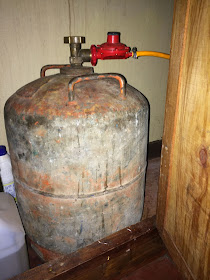by Kayla Hedin
MK Teacher
Some people resist change; others welcome it and even seek
it out. For some people, the thought of change incites anxiety, while for
others it causes excitement. Although this may be a little uncommon, I like change.
I like having new adventures and trying new things. Yet even in my desire for
what is new and different, I still crave a sense of control and routine. I
know, pretty contradictory. I like change that I create and can somewhat
predict, yet most change does not come with control and predictability. So can
I really say I like change? I’m not sure.
Moving to Kibuye, Burundi from Lansing, Michigan is by far
the most drastic change I have faced in my life so far. This was a change I
chose, so I should be fine with this, right? Kind of. I sought out this change,
and I knew the transition was coming, but there were many things I felt I was
in the dark about and still more things that I feel I do not know. I like
controlled adventure, and while moving to Burundi is definitely an adventure, I
felt a loss of control in the process.
When I am anticipating or experiencing change and transition
in my life—especially if things are not going the way I planned, the transition
is turning out to be more challenging than I expected, or there are a lot
of unknowns—it is easy for me to fall into negative thought patterns. I begin
to trade peace for anxiety, confidence for fear, and faith for self-reliance. I
get caught up in the idea that failure in a particular situation would be
unbearable and resolve to just try harder.
In the weeks leading up to my departure, this tendency to
fear was evident. The smallest upsets in plans made me feel like my world was
falling apart. Anticipating the changes I knew were coming and considering the
fact that I would also be facing changes I could not anticipate caused fear and
anxiety at times. If I am not careful, my concerns, fears, and even resolutions
to try harder or do better can become consuming and make me the center of
everything. I remember clinging to 2 Timothy 1:7 in the weeks leading up to my
departure. I had to remind myself over and over that God has not given me a
spirit of fear. He was with me in the midst of my anticipation and is
with me still, and I don't have to hold on to the fear that sometimes creeps into my heart.
I arrived in Kibuye near the end of April. As could be
reasonably expected, I was both nervous and excited. I soon settled in to a
routine and began to learn about how to thrive in Kibuye. Over and over, I
thanked God that I had a roommate who had been in Kibuye for eight months to
help me in my transition to life here. She was such a blessing and a huge part
of why I think I transitioned well at the beginning...But then more change
came, and with that, another transition. At the end of the school year, my
roommate’s internship came to an end, and it was time for her to go back home
to the United States. Other families were also leaving at that time—some for
the summer, and some for six months. In a matter of days, the Kibuye I was in
looked and felt much different than the Kibuye to which I had arrived.
 |
| A goodbye picture with my roomie. |
During the first week of families being gone, someone said
to me, “Welcome, to June—the worst month in missions.” He went on to explain
how June is a month full of change, and that it can be hard. I was definitely feeling the effects of the changes that June brought, and it was such a relief to hear someone (more
experienced in missions than myself) express what I did not yet have words for.
In the midst of my transitional season, I did not pay much attention to the
transitions and changes those around me were facing, and his words helped bring
me out of my own little universe and realize that everyone around me was
experiencing these changes in different ways. With new families being added to
the team, people coming for short-terms, and core families leaving for HMA, the
team is constantly in flux, and this can be hard for everyone. In a small,
tight-knit community, people’s absences are noticeably felt, and change is
something everyone on the team has to face, including the children I will be teaching. With my recent goodbyes to family and friends at home still pretty fresh in my mind, it was not hard to understand how the kids (and adults) probably felt saying goodbye to their friends, and they were already my friends too at that point! Transitions are
hard, and a life in missions is a life full of change and transitions.
 |
| Our "tunnel of love" to say goodbye to families leaving for HMA. |
Yet I have found that it is extremely difficult to maintain
a negative attitude in the presence of the Lord, so I am trying to get into the
habit of simply sitting in the presence of the Lord when something seems
overwhelming or facing a particular change is frustrating instead of resolving
to figure things out on my own. By intentionally just sitting in God’s
presence, I have begun to experience an unexplainable peace. While
my concerns are still real, God’s power is even more real. Even the things that
feel impossible become possible in the hands of God. I love how the things that
seem huge in my life become so small in the presence of an Almighty God! This
is not to say that my concerns and fears don’t matter or that they suddenly
just disappear. However, scripture gives us assurance about these things. No
matter what season we are in, God is inviting us into his presence. Philippians
4:6-7 says, “Don't worry about anything; instead, pray about everything. Tell
God what you need, and thank him for all he has done. Then you will experience
God's peace, which exceeds anything we can understand. His peace will guard
your hearts and minds as you live in Christ Jesus."
Just because God tells us to not worry does not mean that he
has no sympathy for us when we experience difficult seasons. He understands
more than anyone else could, and he invites us to come to him confidently. This
is clear in Hebrews 4: 14-16: "Therefore,
since we have a great high priest who has ascended into heaven, Jesus
the Son of God, let us hold firmly to the faith we profess. For we do
not have a high priest who is unable to empathize with our weaknesses, but
we have one who has been tempted in every way, just as we are—yet he did not
sin. Let us then approach God’s throne of grace with
confidence, so that we may receive mercy and find grace to help us in our
time of need." In the Bible, we are told “fear not” 365 times! I think
that must be pretty important to our Heavenly Father. We are also repeatedly
told that God is with us and are invited into loving relationship with him.
These truths have been especially powerful for me as I face changes, both
expected and unexpected.
Perhaps transitions never end, even if we stay in the same
place all our lives. We still transition through seasons of life,
relationships, careers, etc. But through all the change that occurs around us,
we can take comfort in the fact that our God is the same yesterday, today, and
forever. I would encourage you to reflect on the way you face change. Is it
with fear, anxiety, and worry? Is it with a desire to somehow gain control in
the midst of that change? Or perhaps it is with an attitude of
self-sufficiency, a confident attitude that you’ll figure things out and
everything will be fine. Regardless of the way you face change, in what ways
can you invite God to be a part of that? In what ways might he be calling you
to deeper dependence on him through the transitions and changes you face?

































